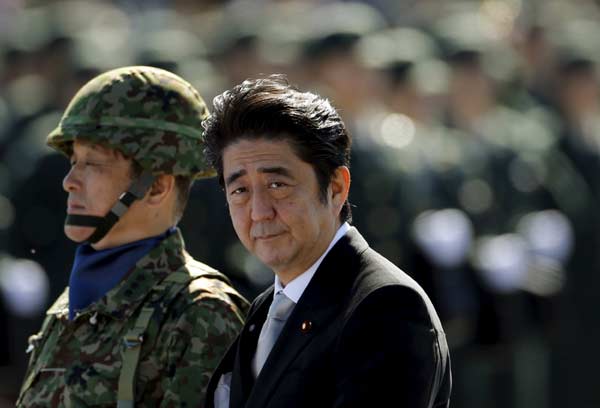Japan's record defense budget unsettling region
Updated: 2015-12-29 07:53
By Cai Hong(China Daily)
|
||||||||
 |
|
Japanese Prime Minister Shinzo Abe (R) reviews Japanese Self-Defence Forces' (SDF) troops during the annual SDF ceremony at Asaka Base in Asaka, near Tokyo, in this October 27, 2013 file photo. [Photo/Agencies] |
The record-high defense budget Japan's cabinet approved on Thursday is heavily geared toward expanding the role of the country's Self-Defense Forces and broadening the cooperation between Japan and the United States.
The 5.1 trillion yen ($42.1 billion) request is part of a 96.7 trillion yen ($800 billion) national budget plan for fiscal 2016 that begins from April.
Japan's defense spending was falling before Shinzo Abe returned to the prime minister's office in 2012. Under his watch, the declines have been reversed.
The new defense budget is the fourth consecutive increase under his leadership, up 2.2 percent from the current fiscal year, and the first since Japan revised its bilateral defense guidelines with the US and enacted new security legislation to strengthen its military role and allow wider cooperation between the two allies.
Japan revised the guidelines for the defense cooperation with the US in April. The new Acquisition Technology and Logistics Agency under Japan's defense ministry became operational on Oct 1. And most importantly, new security laws that allow Japan to exercise the right to the collective self-defense were pushed through the Diet in September.
Although opinion surveys suggest the Japanese public is wary of the changes, the Abe administration has determinedly railroaded them through. And it is clear that the changes being initiated are largely China-centric. Japanese defense white papers have repeatedly posited China as the main source of security concerns in recent years.
Among other things, the Japanese defense ministry's budget proposal claims such spending is necessary to defend its island-dotted ocean territory stretching 1,400 kilometers from the Japanese mainland almost to Taiwan. Money will also be allocated to building and extending military bases along the island chain. By bolstering its military presence on islands with radar stations, troop bases and missile batteries Japan wants to gain a tactical advantage over China.
Big ticket items include the procurement of the pricy US Global Hawk unmanned surveillance aircraft and four Osprey tilt-rotor transportation aircraft. Japan will also acquire the new KC46A aerial refueling aircraft to fulfill the role of refueling US military planes as part of the SDF's rear-echelon support envisioned in the security laws.
- Commentary: New US-Japan defense guidelines inject instability in East Asia
- Take objective view of scholar's remarks on Japan's militarism
- Japan should not upset G20 Summit over South China Sea issue
- Relations with Japan thawing but not yet warm enough
- Time for Japan to stop blaming China
- FM: Japan has no rights to comment irresponsibly on S. China Sea issue
- Global health entering new era: WHO chief
- Brazil's planning minister steps aside after recordings revelation
- Vietnam, US adopt joint statement on advancing comprehensive partnership
- European border closures 'inhumane': UN refugee agency
- Japan's foreign minister calls A-bombings extremely regrettable
- Fukushima impact unprecedented for oceans: US expert

 Stars of Lijiang River: Elderly brothers with white beards
Stars of Lijiang River: Elderly brothers with white beards
 Wealthy Chinese children paying money to learn British manners
Wealthy Chinese children paying money to learn British manners
 Military-style wedding: Fighter jets, grooms in dashing uniforms
Military-style wedding: Fighter jets, grooms in dashing uniforms
 Striking photos around the world: May 16 - May 22
Striking photos around the world: May 16 - May 22
 Robots help elderly in nursing home in east China
Robots help elderly in nursing home in east China
 Hanging in the air: Chongqing holds rescue drill
Hanging in the air: Chongqing holds rescue drill
 2.1-ton tofu finishes in two hours in central China
2.1-ton tofu finishes in two hours in central China
 Six things you may not know about Grain Buds
Six things you may not know about Grain Buds
Most Viewed
Editor's Picks

|

|

|

|

|

|
Today's Top News
Liang avoids jail in shooting death
China's finance minister addresses ratings downgrade
Duke alumni visit Chinese Embassy
Marriott unlikely to top Anbang offer for Starwood: Observers
Chinese biopharma debuts on Nasdaq
What ends Jeb Bush's White House hopes
Investigation for Nicolas's campaign
Will US-ASEAN meeting be good for region?
US Weekly

|

|







